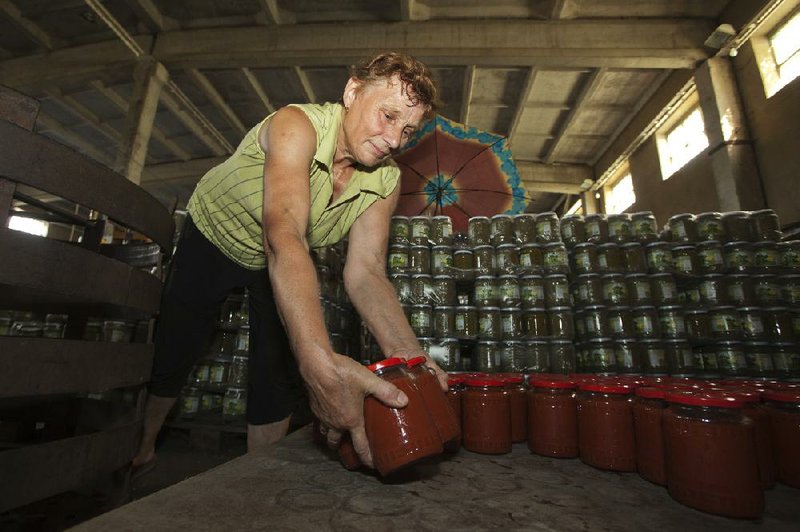HARBOVAT, Moldova -- Two weeks before Russia banned most food from the West, it placed a similar embargo on produce closer to home in Moldova, a small Eastern European country seeking deeper ties with the European Union.
Farmers here in one of the poorest corners of Europe, including apple farmer Sergiu Calmac, are already struggling. Some have decided not to harvest some of their fruit and vegetables at all this season. Calmac's predicament is one that farmers across Europe and beyond can expect to some degree after Russia expanded the circle of countries targeted by its food embargoes.
"A weaker person than me would lose his mind, seeing how his work and investment are being lost," said Calmac, a 60-year-old who has farmed for 26 years. "I have never had a situation like this."
In late July Russia banned foods from Moldova and Ukraine -- both former Soviet republics that the Kremlin wants to keep in its sphere of influence -- after they moved to deepen their political and economic ties with the European Union. A ban on Polish fruit and vegetables soon followed as the Polish government called for sanctions against Russia for its aggression in Ukraine. Last week Russia took things further, banning most food imports from the West in retaliation for sanctions imposed as tensions mount over Ukraine.
The consequences of this geopolitical economic battle are particularly painful in Moldova because it is already one of Europe's poorest countries. The average monthly salary is only $300 and 30 percent of its GDP comes from remittances sent home by the 600,000 Moldovans -- from a nation of 4 million -- working abroad.
Prime Minister Iurie Leanca criticized the embargo, calling it "a violation of the principles of economic cooperation between Moldova and Russia," and promised some compensation to fruit farmers "within the limits of possibility."
A largely agricultural country, Moldova depends heavily on its trade with Russia. Fruit was its largest export, with 90 percent of its apples sent there before the ban. The lost revenue from apples alone is expected to reach $50 million, or three-quarters of a percentage point of GDP. And while the government does not yet have an estimate for the overall loss, the situation will certainly be worse once other produce is factored in.
Amid the political tensions, Russia has also hinted that some 300,000 Moldovan workers in Russia may no longer be welcome.
The disruptions to Moldova's economy also come at an extremely delicate time politically. Moldova has a pro-Russian separatist breakaway region, Trans-Dniester, that longs to be united with Russia.
The country also faces elections in November expected to determine whether it stays on its pro-Western course or politicians friendlier to Moscow take over. Wedged between European Union member Romania and Ukraine, Moldova has an electorate deeply divided over whether to grow more aligned with the West or Russia. If voters blame their pro-Western government for any new economic pain, that could shift the balance with lasting consequences.
"Should the economic effects be felt in Moldova with this embargo, not only would pro-Moscow parties use this to their advantage to try to keep Moldova in Moscow's orbit, but it would also have the effect of derailing or delaying Moldova's aspirations to be part of the European Union," said Stephen Nix, the director of the Eurasia program with the International Republican Institute, a pro-democracy organization based in Washington.
In an interview at his sprawling orchard in Harbovat, a village in southern Moldova, Calmac had only vague criticism for the country's leaders.
"I realize that international relations in our region are complicated, but the government could have put more effort into this," he said.
Instead, he is most concerned about how he will pay his 200 employees and repay $290,000 that he owes to pesticide companies. He is hoping the companies will allow him to postpone his payments. He expects to lose $255,000, which was 75 percent of his 2013 profit.
Business on 08/13/2014


